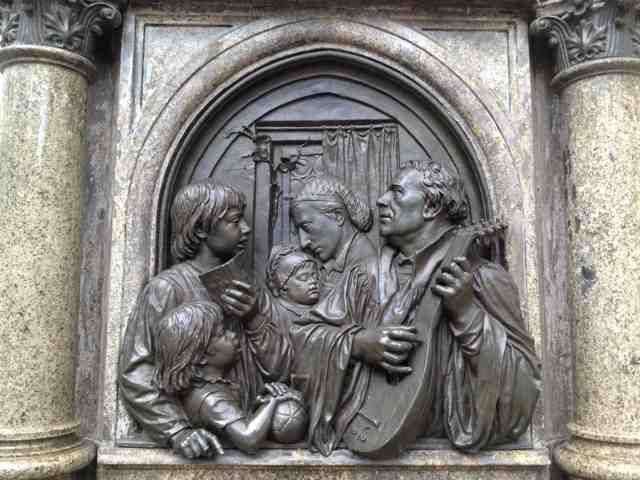Pause with me in our narrative of Luther and Katie’s life
together. How had marriage gotten so corrupted by the Medieval Church? In one
of his influential pamphlets, “The Babylonian Captivity of the Church,” Luther
made a frontal assault on the “foul contagion” of the entire sacramental system
of Rome.
He
decried making transubstantiation, indulgences, pilgrimage, baptism, marriage,
monasticism, and penance into means of earning salvation. Even baptism and the
Lord’s Supper Rome had mangled and distorted until they bore no resemblance to
the two sacraments Jesus had established. “What Rome has done with the
sacraments,” declared Luther, “I compare to a lie, which like to a snowball,
the longer it is rolled the greater it becomes.” Luther wanted to restore a biblical
understanding of justification that comes not of works or sacraments, but by
grace alone, through faith alone, in Christ alone.
Chief among the trumpery of Rome’s sacerdotal system was the
garbling of marriage into a sacrament. According to canon law, monasticism and
priestly celibacy were the higher order sacraments, but for the secular
vocations marriage had been morphed into a sacrament, a means by which the
lower order of society might have a better chance at achieving salvation. To
Luther this was yet another instance of doctrinal bilge water spewing from
Rome.
Far from having
a lower view of marriage, however, Luther wanted to restore marriage to its
rightful place in God’s economy of grace. Just as there was no inherent grace
in taking monastic vows of celibacy, so there was no salvific grace to be
gained in marriage. Moreover, it
was doubly scandalous when men who had taken vows of chastity so shamelessly
violated those vows. Alexander VI, the pope of Luther’s youth, kept several
mistresses and fathered numerous illegitimate children; on his pilgrimage to
Rome in 1510 Luther witnessed priests consorting with prostitutes at specially
sanctioned brothels reserved exclusively for clerics.
Master of the invective insult, Luther declared of
the pope: “You were born from the behind of the devil, are
full of devils, lies, blasphemy, and idolatry; are the instigator of these
things, God’s enemy, Antichrist, desolater of Christendom, and steward of
Sodom.” Due to the stranglehold such abuses had on the common man, Luther felt
justified in resorting to such vitriol. Later, however, upon more sober and
gospel reflection, Luther said, “I am more afraid of my own heart than of the pope and all his
cardinals. I have within me the great pope, Self.” Nevertheless, he was called
in violent times to decry unsupportable abuses. Rome itself he declared, “the most licentious den of
thieves, the most shameless of all brothels…”
If marriage was not a sacrament, however, what was it? “Marriage is the God-appointed and legitimate
union of man and woman in the hope of having children or at least for the
purpose of avoiding fornication and sin, and living to the glory of God. The ultimate purpose of marriage is to obey
God, to find aid and counsel against sin; to call upon God; to seek, love, and
educate children for the glory of God. To live with one’s wife in the fear of
God and to bear the cross; but if there are no children, nevertheless, to live with
one’s wife in contentment; and to avoid all lewdness with others.”
Though at first adamant in his refusal to marry, it was only
when Luther moved from writing theoretically about marriage to entering into
the covenant of marriage itself that he came to see it as a lovely school of
character, an ordinary means, gifted by a gracious God, whereby a husband and
wife might grow in grace together and in the knowledge and love of Christ.
MATRIMONIAL
TRAIN WRECK... Part 3
Douglas Bond is author of LUTHER IN LOVE and more than twenty-five other books of historical fiction, biography, devotion, and practical theology. He is lyricist for New Reformation Hymns, directs the Oxford Creative Writing Master Class, speaks at churches and conferences, and leads Church history tours in Europe. Watch for his forthcoming book God Sings! (And Ways We Think He Ought To); preorder a signed copy of God Sings! today at bondbooks.net and receive a free copy of Bond's New Reformation Hymns album.























.JPG)



























